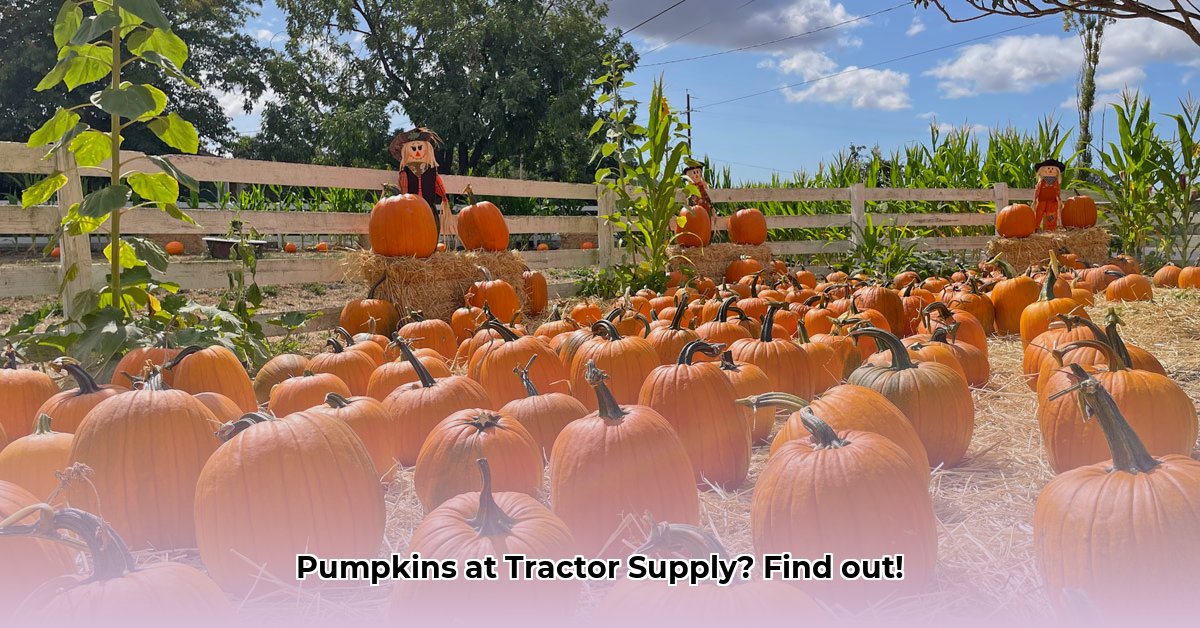
Yes, Tractor Supply stores frequently stock pumpkins during the autumn harvest season. But before you grab one for carving or pie-making, let's explore the fascinating journey of your pumpkin – a journey that touches upon sustainability and the conscious choices we make as consumers. For more information on Tractor Supply's distribution, check out this link.
Does Tractor Supply Sell Pumpkins? A Deeper Dive into Sustainable Choices
The simple answer is yes; Tractor Supply often carries pumpkins. However, the question of where your pumpkin comes from impacts the environment significantly. This article unravels the story behind your pumpkin, from seed to supper, highlighting sustainable options and helping you make informed choices this fall.
From Seed to Supper: A Pumpkin's Journey and Its Environmental Impact
Imagine a perfectly round pumpkin. Picture the farmer’s hands carefully nurturing its growth. This seemingly simple image masks a complex story of environmental impact. Was this pumpkin grown on a vast commercial farm, requiring significant resources and transportation? Or did it come from a small, local farm down the road? These origins tell vastly different stories about sustainability.
Large-scale farms, while efficient in producing mass quantities, often rely on methods that can strain the environment. Consider the water, fertilizers (chemical compounds used to enrich soil), and pesticides employed. Then there's transportation – the fuel burned trucking pumpkins across states significantly increases a pumpkin's carbon footprint. The amount of energy required to transport pumpkins long distances is substantial, making locally sourced options more environmentally friendly.
In contrast, a pumpkin from a nearby farm boasts a drastically reduced carbon footprint due to shorter transportation distances. This choice also supports local farmers and their communities. Buying local offers a small change with big environmental and economic benefits.
Tractor Supply Pumpkins: A Closer Look at Sustainability
Are Tractor Supply pumpkins sustainably sourced? It's difficult to provide a definitive answer. Large retailers often lack transparency regarding their suppliers and farming practices. Without detailed information on cultivation methods, transportation systems, and packaging, assessing the overall sustainability of their products remains challenging. More comprehensive labeling and transparent supplier information from retailers would certainly help encourage greater sustainable farming practices.
This lack of transparency highlights a critical consumer challenge: making informed choices. Therefore, considering options outside large retailers becomes imperative.
Local Alternatives: More Transparency, More Sustainability
Local farmers' markets and smaller farms offer a transparent, sustainable alternative. You can directly interact with the farmer, inquiring about their growing methods, water usage, or fertilizer choices. This personal connection provides a clearer understanding of the pumpkin's story, empowering you to make more conscious choices.
Online pumpkin purchases are convenient but often come with a higher environmental cost due to packaging and shipping. This trade-off between convenience and sustainability needs careful consideration.
Making Sustainable Pumpkin Choices: A Step-by-Step Guide
Here's how to make more sustainable pumpkin purchases this fall:
- Prioritize Local Options: Start your search at local farmers' markets or smaller farms. These often prioritize environmentally friendly practices.
- Choose Locally Grown Pumpkins: Minimize transportation emissions by selecting pumpkins from nearby farms—a simple action with tangible positive impact.
- Buy Only What You Need: Reduce food waste by purchasing only the pumpkins you'll use, minimizing unnecessary purchases.
- Look for Sustainable Certifications: While not always common for pumpkins, certifications like “organic” indicate sustainable farming practices.
- Choose Minimally Packaged Pumpkins: Opt for pumpkins with minimal plastic wrapping to reduce waste.
- Compost Pumpkin Scraps: After Halloween, compost your pumpkin scraps to reduce waste and enrich your garden soil.
The Broader Picture: Sustainable Agriculture – Beyond Pumpkins
Our pumpkin choices illustrate a vital point: the importance of sustainable agriculture. It's a farming system designed to protect the environment, fairly compensate farmers, and provide healthy food. Moving beyond pumpkins, consider the broader impact of your food choices. Sustainable farming centers on reducing water and fertilizer use, increasing biodiversity, and minimizing pesticide use. Every choice – from buying pumpkins to disposing of leftovers – has environmental consequences.
A Call to Action: Working Towards a Greener Future
Making informed decisions can build a more sustainable future. This fall, let’s enjoy the harvest responsibly, considering both the delicious taste and environmental impacts of our choices. The table below outlines actions for various stakeholders:
| Stakeholder | Short-Term Actions | Long-Term Actions |
|---|---|---|
| Consumers | Buy local; reduce online orders; choose minimal packaging; reduce waste. | Advocate for transparency; support sustainable certifications; demand better supply chain information. |
| Retailers | Offer more local options; improve packaging; increase sourcing transparency. | Implement sustainable supply chains; partner with sustainable farmers; offset carbon emissions. |
| Local Farms | Improve marketing; explore CSA (Community Supported Agriculture) models. | Invest in sustainable infrastructure; diversify products; expand direct-to-consumer sales. |
| Governments/NGOs | Offer incentives for sustainable practices; fund research; educate consumers. | Develop strong standards; support local food systems; fund life-cycle assessments of agricultural practices. |
By acting responsibly, we can create a more sustainable future. Let's enjoy this harvest season mindfully, appreciating both the delicious flavors and the environmental considerations involved.